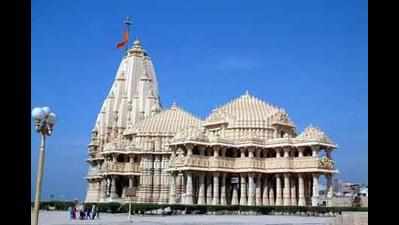- News
- City News
- ahmedabad News
- Somnath, Ambaji temples OK with plastic money
Trending
This story is from November 30, 2016
Somnath, Ambaji temples OK with plastic money
Soon after the Centre’s demonetization move major temple trusts across the state are taking steps to go cashless when it comes to accepting donations and funds. In fact, the Somnath temple has been accepting cashless donations since 2007, enabling donors to swipe cards or make online transfers.

Somnath Temple
AHMEDABAD: Soon after the Centre’s demonetization move major temple trusts across the state are taking steps to go cashless when it comes to accepting donations and funds. In fact, the Somnath temple has been accepting cashless donations since 2007, enabling donors to swipe cards or make online transfers.
The trust is now in talks with the digital wallet, to enable it to accept funds and donations digitally.The temple trust has also begun accepting e-payments for the ‘prasad’ (food served to gods). On an average, ‘prasad’ worth Rs 5-7 lakh is prepared every month at the temple and the same amount goes upto Rs15-20 lakh during Bhadarvi Poonam. “We started accepting donations online nine years ago,” said PK Lahiri, trustee and secretary, Shri Somnath Trust. “Due to this, a number of NRIs and international visitors have made their donations online for puja Vidhi, dhaja puja and prasad. We plan to expand the same and make more digital payment options available to the people,” said Lahiri. Moreover, with effect from 2017, the temple will also send ‘prasad’ based on online requests. This will make Somnath temple to be the first across Gujarat to begin sending prasad via couriers.
Demonetization has also led the trust of Ambaji temple to begin accepting donations online and has opened up several digital payment avenues . “Donations for the bhandara would be accepted online as well as through swipe machines,” said Jenu Dewan, chairman, Arasuri Ambaji Devsthan Trust. “Card swiping machines have been installed at bhojanalya and resthouse ,” Dewan said.
The trust is now in talks with the digital wallet, to enable it to accept funds and donations digitally.The temple trust has also begun accepting e-payments for the ‘prasad’ (food served to gods). On an average, ‘prasad’ worth Rs 5-7 lakh is prepared every month at the temple and the same amount goes upto Rs15-20 lakh during Bhadarvi Poonam. “We started accepting donations online nine years ago,” said PK Lahiri, trustee and secretary, Shri Somnath Trust. “Due to this, a number of NRIs and international visitors have made their donations online for puja Vidhi, dhaja puja and prasad. We plan to expand the same and make more digital payment options available to the people,” said Lahiri. Moreover, with effect from 2017, the temple will also send ‘prasad’ based on online requests. This will make Somnath temple to be the first across Gujarat to begin sending prasad via couriers.
Demonetization has also led the trust of Ambaji temple to begin accepting donations online and has opened up several digital payment avenues . “Donations for the bhandara would be accepted online as well as through swipe machines,” said Jenu Dewan, chairman, Arasuri Ambaji Devsthan Trust. “Card swiping machines have been installed at bhojanalya and resthouse ,” Dewan said.
End of Article
FOLLOW US ON SOCIAL MEDIA










